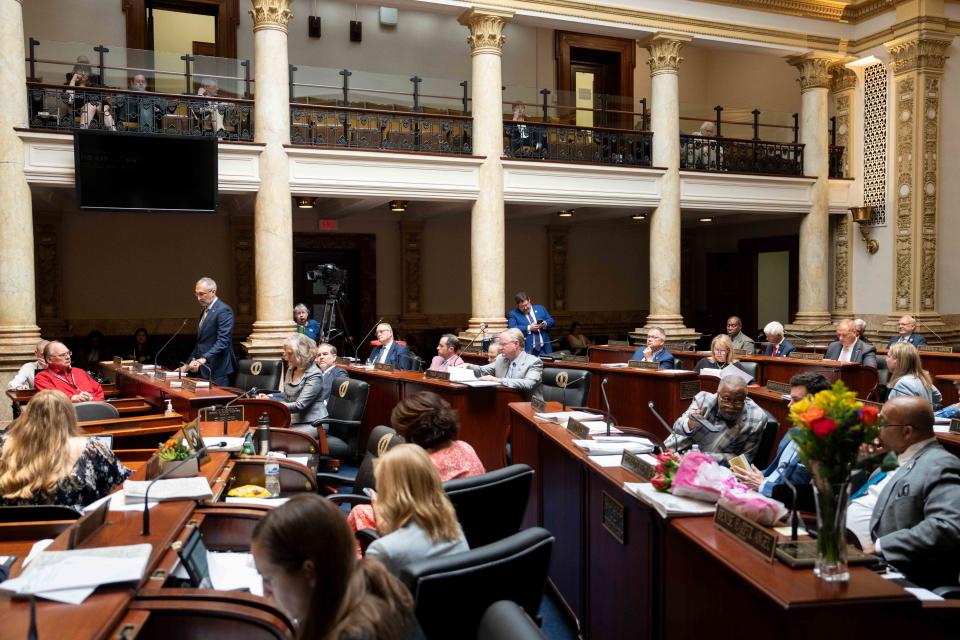What is the "school choice" bill asking voters? Here's what you need to know
This story is the first of several stories the Courier Journal will publish on the "school choice" amendment, which Kentuckians will vote on in November.
This November, Kentuckians have the opportunity to add two amendments to the state constitution, one being the "school choice" measure.
The proposal, passed by the General Assembly during the 2024 legislative session, sparked heated debate between Republicans and Democrats. But ultimately, it's up to voters to decide if the amendment becomes law.

What exactly is this measure asking, and how would it effect the commonwealth? Here's a breakdown.
What does the amendment ask?
Kentuckians will be asked if they want to add the following section to the state constitution: “The General Assembly may provide financial support for the education of students outside the system of common schools. The General Assembly may exercise this authority by law, Sections 59, 60, 171, 183, 184, 186, and 189 of this Constitution notwithstanding.”
Voters will give a straight "yes" or "no" response.
If passed, the amendment gives a green light to the General Assembly to introduce future legislation related to funding education options besides public schools.
"I think the most important thing for voters to understand is the amendment doesn't definitively tell what would be allowed; what the legislature would do once the constitution changes," Stephen Voss, a University of Kentucky political science professor, said.
In broad terms, the first part of the constitutional amendment asks whether voters want the General Assembly to send public tax dollars to non-public schools.
Currently, the constitution allows taxpayer money to only fund “common schools," which has been interpreted by Kentucky courts as public. That means the legislature cannot steer state money to other entities, including private or charter schools.
The second part of the proposal says other language in the constitution cannot be interpreted in a way that nullifies this amendment.
“What the proposal is basically saying… is if that were the case and the court were to see, 'oh, there's a potential conflict here,' they can't use one of these other provisions to functionally nullify the effect of this amendment,” Jeffrey Budziak, a Western Kentucky University political science professor said.
Story continues after this form.
How would the amendment affect Kentuckians?
It's unknown how the amendment passing will impact Kentuckians, though Voss said any changes will not be immediate. That’s because the amendment only removes barriers from the constitution and doesn’t identify what policy could result.
“It's removing the parts of the constitution that prevent alternative models from the common system of public education, but it's not saying exactly what would be set up by the state afterward,” Voss said. “All we know is the amendment adds flexibility to the solutions available to the legislature.”
But that doesn’t mean there isn’t buzz on what could follow this amendment.
Budziak said mechanisms such as school vouchers, tax credit scholarship programs and educational savings accounts would all be possibilities. The earliest any of these could come up is during the 2025 session — as the amendment has to pass before any option is even brought to the table.
Why is this amendment on the November ballot?
The state constitution only allows tax dollars to fund "common schools," which Kentucky Courts have cited and interpreted it as public schools.
Kentucky Republicans have tried for years to pass policies to expand school choice. The courts, however, have blocked previous bills allowing state funds to pay for private schools. Charter schools are a part of those efforts and have been legal in Kentucky since 2017, but haven't operated because of a lack of funding.
During the 2021 legislative session, lawmakers passed a tax credit for individuals who donated to nonpublic school tuition. The Kentucky Supreme Court ruled the program unconstitutional the following year, citing a section of the Kentucky constitution that prohibits the state from raising funds for nonpublic schools.
Then, in 2022, the legislature tried again by creating a permanent funding structure for charter schools, but that too was struck down by Franklin Circuit Court Judge Phillip Shepherd. Shepherd said in his ruling that the attempt to "establish a separate class of publicly funded but privately controlled schools" would create a "separate and unequal system." He also added that charter schools are not "common" or "public schools" within the meaning of the constitution.
That led to Republicans prioritizing House Bill 2, also known as the "school choice," bill during this year's legislative session.

Sponsored by Rep. Suzanne Miles, R-Owensboro, the bill was fast-tracked but received opposition from Democrats, who argued the amendment could harm public schools by diverting funds from the system.
In order to get constitutional amendments on a ballot, the measure must gain support from three-fifths of both the Kentucky House and Senate. Passed amendments are not subject to a gubernatorial veto and go straight to the Secretary of State's office.
Under Kentucky law, it only requires a majority of votes cast to pass the amendment and change the state constitution. It will be labeled as a constitutional amendment on the November ballot.
Reach reporter Hannah Pinski at [email protected] or follow her on X, formerly known as Twitter, at @hannahpinski.
This article originally appeared on Louisville Courier Journal: What is the "school choice" bill asking? Here's what you need to know
